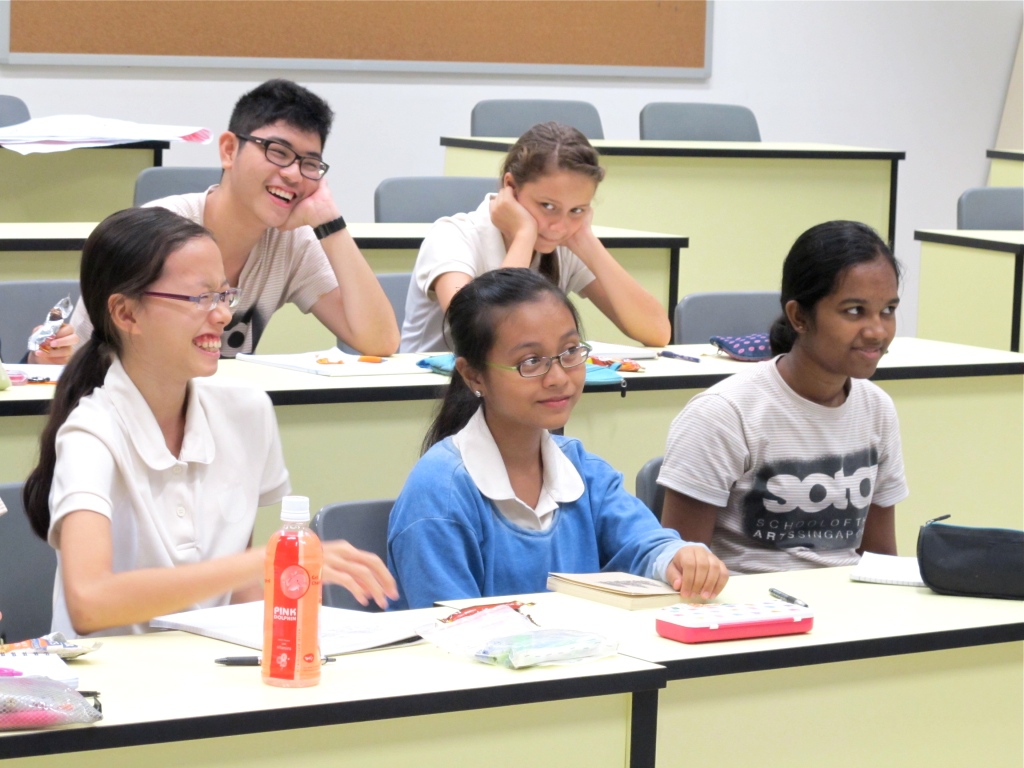The Year Two students who attended Yong Shu Hoong‘s creative writing workshop as part of Words Go Round 2013 – the annual Singapore Writers Festival School Programme – had an enriching time of learning and experimenting with rhyme and free verse. Besides the following thoughts about the workshop, some poems that resulted from the creative writing exercises are also featured for your reading pleasure.
Teh Wen Hui
This workshop is extremely engaging and highly productive. It benefited me greatly in my understanding of literature. It revolved around the poetic aspect of introducing rhythm into writing, making it more interesting and readable as rhythm helps to draw the reader’s attention to selected words through emphasis in a text.
Many ways to synthesise a form of rhythm into poems were discussed. Rhyme is one method that can be used to elicit a rhythmic structure in a poem. By having the chance to present our poems before an audience, we ventured beyond the usual realm of writing poetry, allowing the effectiveness of the rhyme scheme incorporated to be evaluated better.
Another way to infuse rhythm into a poem is to tweak the number of syllables in each line, or break them at appropriate places to create a desired effect, such as a flowing style of reading or a more disjointed, jerky one.
The topic of subtext was also briefly discussed. We learned ways of structuring words to lead our reader towards a desired opinion. During the workshop, much opportunity to engage in creative writing was given. This was highly interesting and very beneficial, as it allowed us to improve our writing with guidance from a professional writer who has had experience publishing works of literature.
Meeting a poet was a very interesting experience. Any tension between us was immediately relieved through humour and his engaging personality, and this facilitated our discussion on poetry. It was also very encouraging to meet a successful writer in person. This inspired me to work harder at my writing.
One important piece of advice I received from Mr Yong was to live life to its fullest and indulge in its very marrow. I can put his words into practice by using what time I have, to do the things that I find are most meaningful to me, such as dance. I find them very encouraging as they remind us to seize the moments when we can still enjoy life and peruse them well.
My experience of this workshop had greatly exceeded by initial expectations. I have not just learned be a better communicator through my poems, but also feel encouraged to live life to its fullest. As a participant, I thus find my experience at this workshop highly meaningful and greatly nourishing.
Mona Hanae Gomez
The workshop that Mr Yong Shu Hoong conducted on poetry benefited me, not only by deepening my appreciation of poetry, but also by expanding my horizons on ways to create rhyme in poetry.
Before the workshop, I had always thought that poetry could only either have a rhyme scheme or have no rhythm at all. I liked how Mr Yong used examples of songs to help us understand how songwriters create rhythm without having used rhyming words. For example, the use of repetition and having breaks to the next line or a stanza in the middle of a phrase.
I definitely appreciate poetry more after the workshop. I have come to like rhyming poems more because the ones introduced to us were unique and striking. I also understood more about free verse and learned to like it even more than I do, which seemed impossible at first.
On top of that, meeting a Singapore-based writer was inspiring. I do not often get to meet poets who write from a similar cultural perspective as I do.
The most important piece of advice from Mr Yong was probably to “keep writing.” I realised that this parting message was actually put in practice when I wrote poetry on the spot during the workshop.
By urging myself to “keep writing,” I realised that I was inspired to write even more. This motivation is something that is important not only to someone who likes to write, but also to artistic practice in general.
No by Mona Hanae Gomez
no
i let the word sink in
seep through my body through the
scars and through
the bruise
through the spaces between my toes.
no
no. no. no
no.
the flowers that once grew
and filled by heart with joy
turned into weeds.
that uprooted and
dispersed
along with the fragments of my
shattered heart.
no.
then I felt the empty
sound of the word
resonate in my now-hollow chest
and tasted like
black
coffee.
then that
“no”
became
no-thing
but an aftertaste
but a bitter, distant memory.
Owlmoon by Zachary Singson Dominguez
The hoot of an owl
Short and sweet
Staccato
Brings calm and serenity
Time distends, stars shine
The moon mirrors
With its bright beam.
The trees join
In the symphony of the night
The cicadas chime in
With their sonority and drone,
Until the night
Is soothed
With this polyphony.




